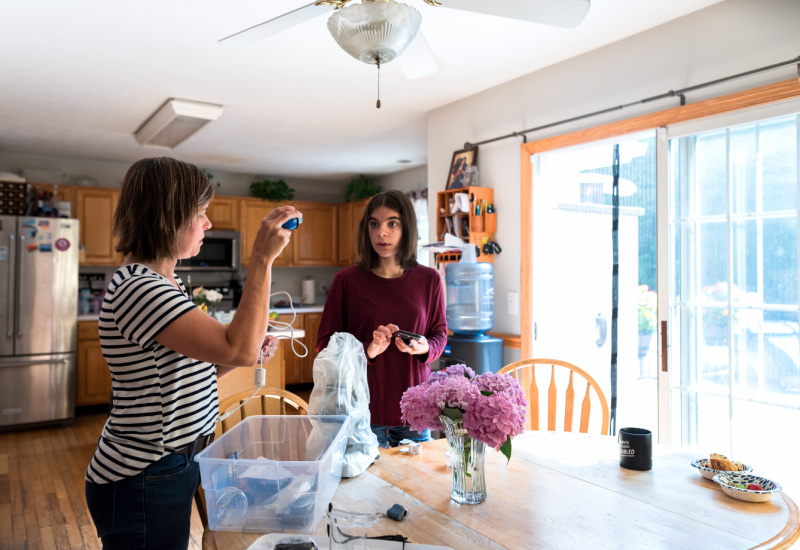Self-Care and Co-Regulation | Balancing Parenting and Sensory Needs
In this episode of the podcast, host Colleen Kessler is joined by Sarah Collins, an occupational therapist and homeschool mom. Together, they delve into parenting with sensory needs and challenges while homeschooling neurodivergent children.
This episode aims to provide valuable insights and practical tips for parents in similar situations, recognizing the importance of self-care and co-regulation in raising healthy, well-adjusted children.

Addressing Personal Challenges
Colleen and Sarah discuss the cycle that can occur when parental challenges trigger the challenges faced by their neurodivergent children. Understanding and proactively addressing personal challenges is crucial for parents to effectively homeschool their children.
Sarah provides guidance on self-care, highlighting the significance of recognizing and meeting one’s own needs.
Modeling Healthy Adulthood and Parenthood
Colleen emphasizes the importance of modeling a healthy adulthood and parenthood to children. This means understanding and meeting one’s own needs to effectively help children navigate life.
By showcasing self-care and healthy habits, parents can foster resilience and emotional regulation in their children.
The Concept of Co-regulation
Co-regulation refers to the process of helping children regulate their emotions and behaviors, and it requires parents to be regulated themselves. Communication is key in helping children understand their own needs and the needs of others.
Sarah and Colleen discuss various resources available to help individuals understand their sensory quirks, regulate themselves, and ultimately support their children.
Redefining Self-Care
Self-care is more than just indulging in bubble baths and treats; it’s about truly understanding and meeting one’s own needs. Through this understanding, parents can provide the necessary support and guidance for their neurodivergent children.
The podcast encourages listeners to prioritize self-care as an essential aspect of parenting and homeschooling.

Occupational Therapy and Homeschooling
As an occupational therapist, Sarah recognizes the prevalent areas of concern for homeschool parents – sensory processing, executive functioning, and handwriting.
She highlights the role of occupational therapy in addressing activities of daily living and achieving success in desired occupations.
Understanding the eight senses, including the newer area of interoception, is essential to support children’s sensory needs effectively. It’s for parents to prioritize self-care, co-regulate with their children, and seek out resources to better understand and address their own sensory quirks. By modeling healthy habits and understanding their children’s needs, they can create a nurturing environment where their children can thrive.
- CTC Math
- The Learners Lab, a Raising Lifelong Learners Community
- Strengthening Executive Function Skills | A Conversation with Sarah Collins
- Sarah’s Executive Function Focus Group *Use Coupon Code: RLL15
- Sensory Quiz for Personal Awareness
- Homeschool OT | Sensory Systems
- Kelly Mahler | Interoception
- Cara Kosinski | Interoception
- Zones of Regulation
- Alert Program
- Executive Function Skills Workbook (digital copy)
- Executive Function Skills Workbook (print copy)
- Executive Function Skills Workbook Companion Planner (digital copy)
- Executive Function Skills Workbook Companion Planner (print copy)
- The Anxious Parent of the Anxious Child | Using Social Stories
- The Power Of Reading For Gifted Children: Advanced Readers And Social Emotional Learning
- The Best Books for Teaching About Executive Functions Skills
- 7 Executive Functioning Activities for Small Children
- RLL #84: Exploring Education and Executive Function with Seth Perler
- The Unmeasured Executive Functioning Issue
- RLL 20: Helping Your Kiddo with Executive Function Skills Struggles | A Listener Question
- RLL LIVE | Improving Executive Functions
Links and Resources
Leave a Rating or Review
Doing so helps me get the word out about the podcast. iTunes bases their search results on positive ratings, so it really does help — and it’s easy!
-
- Click THIS link to go to the podcast main page.
- Click on View in iTunes under the podcast cover artwork.
- Once your iTunes has launched and you are on the podcast page, click on Ratings and Review under the podcast name. There you can leave either or both! Thanks so much.

